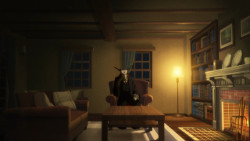 |
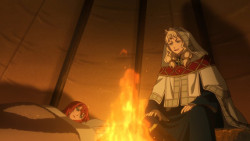 |
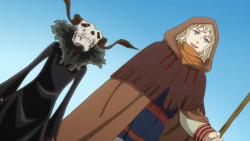 |
 |
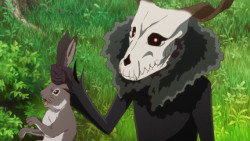 |
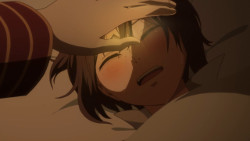 |
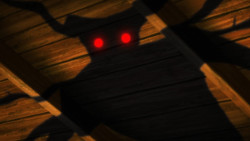 |
 |
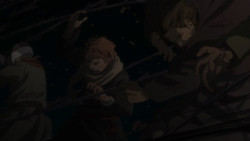 |
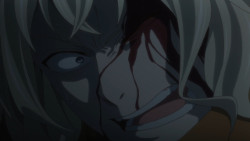 |
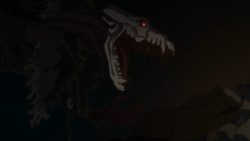 |
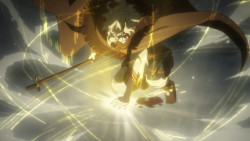 |
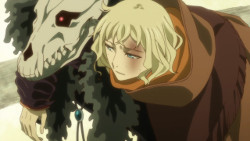 |
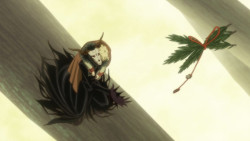 |
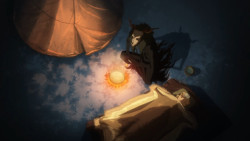 |
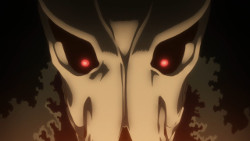 |
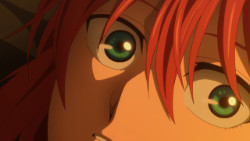 |
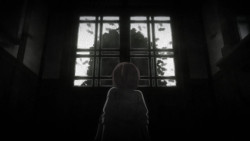 |
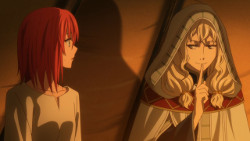 |
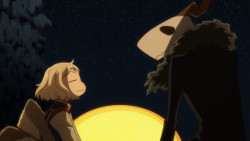 |
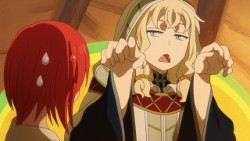 |
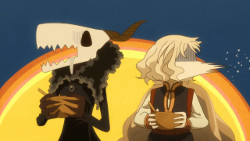 |
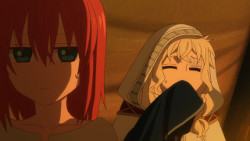 |
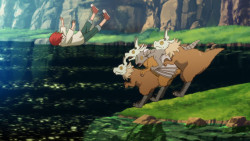 |
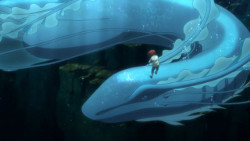 |
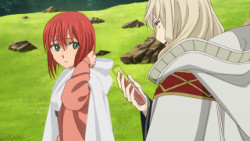 |
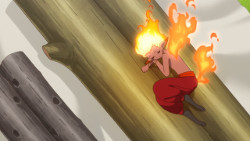 |
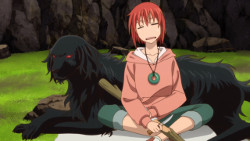 |
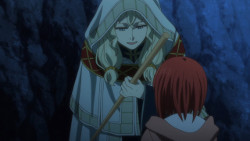 |
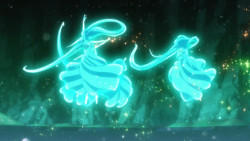 |
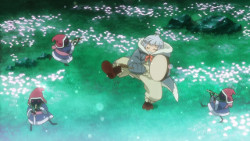 |
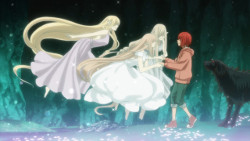 |
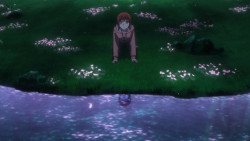 |
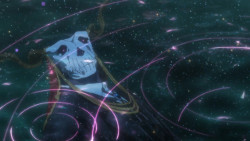 |
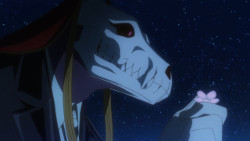 |
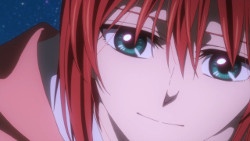 |
「Lovers ever run before the clock.」
Every so often we get one of these anime episode that’s so sublime, so perfect, that it frustrates me as a writer. Because really, what could I possibly do in scribbling a few paragraphs about something so lovely except cheapen the experience? Not only that, if I straight-out say what I thought, it sounds like I’m gushing over it – because in effect, I am. It’s a lose-lose situation, but what can you do? I’d be lying if I said it wasn’t a problem I wish I had to deal with more often.
I knew when I saw those few minutes of footage of Mahoutsukai no Yome way back in July of 2016 (at Anime Expo) that there was potential for some visual magic here. But at this point I’m starting to consider that this show might be the most beautifully drawn and animated TV anime since Hyouka – indeed, I’d put it in that tiny sub-category which holds that series, Seirei no Moribito and frankly, not a whole lot else. It’s not simply about detailed backgrounds and fluid animation – though those obviously help. It’s also about artistry and imagination, a sense of the soul of the animators and artists coming through. Moribito had that, Hyouka had it – and so does The Ancient Magus’ Bride.
In a vacuum, that kind of visual beauty can take you only so far – pretty far, but only so far. But in episodes like this one (and I’d argue most profoundly in this one) Mahoutsukai shows that it has the narrative beauty to go along with it. It can be awkward at times, but this series has a magical quality of transporting you inside the moment, and of making you feel what the characters feel on a visceral level. There’s a pull that the ancient mysteries assert on humans – we all feel it, whether we want to admit it or not. We remember, deep down, the music of wind and water and earth, before there were words. And part of us always longs to return to that feeling of awe, that sense of elemental and inscrutable power that surrounds us at all times.
That’s part of the magic and beauty of this series, no question – that, and the ethereally gorgeous landscapes it transports us to through its incredibly gifted creative staff. But the human story is equally compelling, even if the ones at the heart of it aren’t all human. And as Lindel continues to tell Chise (and us) Elias’ story, it becomes increasingly clear that the Thorn Mage is not human himself. “A quick learner,” Lindel tells us, but “always seeming to be looking in from the outside.” Elias is the shadow the child with the sight (red-haired, it should be noted) sees on the wall in the candlelight. He’s the fury which unleashes itself on frightened villagers after they wound Lindel with a rock. Elias seems as alien to us as any of the faerie folk we’ve met on this journey.
There is a sense that Elias’ privacy is being invaded by having Lindel tell Chise his story – she certainly feels that herself. Even Lindel, powerful mage that he is, was afraid when Elias told him that he was certain he’d eaten humans before – though Lindel was composed enough not to show it. Lindel clearly feels that these are things Chise must hear – and that Elias may never be ready to share them himself – though it’s not, I think, by way of warning to her. In Lindel’s eyes both Elias and Chise are indeed children, and he’s trying to raise them as best he can – to shove them towards the truth when they’re foundering on their own.
After a short but wonderful episode where the pack of dragon bozu knock Chise into the water (again), and she meets what appears to be a water dragon (a scene so beautiful one imagines it must surely be the highlight of the episode) Chise sets about making her wand at last. Her red hair will be the essence of it, Nevin’s branch the heart of it, but now Chise must carve the handle – and Lindel shows her a variety of larges branches to choose from. Each of the source trees is powerful in some way, connected to the mysteries of the ancients. And Lindel advises Chise to talk to herself as she carves – something not so easy for a child with so little sense of self.
As magnificent as all that is, the climax of the episode truly raises the bar – as Lindel reveals the true nature of his magic and his true name, “Echos”. His spells are songs, and in the land blessed by elves they carry great power. I’d be hard-pressed to think of a more perfectly-executed scene in anime this year – “beautiful” doesn’t even begin to do it justice. But there’s a larger story being told here, as Lindel’s magic opens a gateway through a water mirror to where Elias gazes silently into the night through his window. Chise’s first thought when seeing this beauty was that she wished Elias could see it too, and in some small way, thanks to the power of Lindel’s magic and her own desire, he does.
Nothing is simple when it comes to Chise and (especially) Elias, that’s for certain – even in the midst of almost unbearable beauty the body of a sparrow reminds us of that. But when Elias tells Chise that his home feels cold without her, he reveals something of himself in the process. And Chise’s promise to share her own story now that she’s heard so much of Elias’ is a measure of the trust she has in him, in the face of so many warnings and of her own painful interactions with others. If magic is anything, it’s that these two damaged spirits could be connected across a great gulf of the soul and half the Earth.
Preview
 |
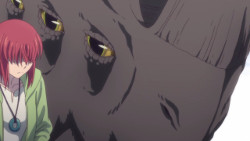 |
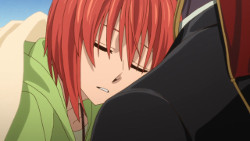 |

Little I can add to your review. You compared it to Hyouka and my memories went back to the last scene and the confession (that was not a confession but still was one) of that show. The scene with the elves and the water mirror is one that moved me as much as that scene in Hyouka. Both were sublime. Each episode seems to show the animators becoming more and more sure of themselves and it shows in their work. It also shows how anime and manga each have different strengths and the music and animation in this episode showed what animation can bring to a story that isn’t possible on a drawn page.
The mangaka, seiyu, and the animators also manage to show Elias’s moods and feelings though his small physical and verbal cues. A great feat IMO given his immobile features.
One thing I’ve come to the conclusion as a viewer is that you have to pay attention to what’s going on at all times or you’ll miss something. In this case Silver going to the window in the opening scene and her burying the bird in the last. Elias “hung up” rather forcefully?
That was certainly how I interpreted it, yeah.
The dilema the episode presents about Elias nature is truly fascinating, he´s partly human in some way but most of him, specially his personality is that of a fairy but neither spicies accept him, they see him as an abomination, fairies cannot accept one of them has flesh and humans see a mosnter from their nightmares. The fact Elias has eaten humans before just adds to this delima, how could anyone judge him? The supernatural creatures of this story have their own set laws and morality, what is sickening to us it´s only natural to them so what about Elias? He´s partly both both at the same time neither of those two races so how do we understand or judge what he did? He has demostrated he´s a good guy with Chise but many have said before he played both the hero and villan in the legends about him…
did silky buried that little bird from before? if so, why nobody comments about that?
Yes, the little bird messenger (that was talking to Elias before) was buried by Silky in the green house. It might be a while before we get an explanation (like, 4 volumes of the manga later), but if you want to know…
Show Spoiler ▼
You missed the last paragraph of my comment. That’s what I was talking about.
I didnt think they would get close to Titania’s entrance seen this season with beautiful moments in anime but its like Studio Wit just said “Hold my beer”.
Once again the music perfectly carries the stunning visuals. Anime of the year is going to be hard to choose at this rate, I mean I was set on Made in Abyss but now im not so sure lol.
Elias’s appearance, where he first came to and the bit about eating people is probably a strong hint at what he might be.
Aww Elias’ last comment at the end.. so sweet.
It’s a little weird that bits of dialogue from the manga is removed, though I understand it’s probably due to time constraints. I thought the conversation between Chise and Ruth was better in the manga. At least it gave a little more context:
Chise: (thinking) He said talk to myself…. (looks at Ruth)
Ruth : Oh no you don’t. You have to talk to yourself.
We share many things, but I’m your familiar. I’m not you.
I will tell you nothing.
Chise: Awww, Ruth…
Ruth : (turns his head away) Hmmph!
There are many points that made this “Mahoutsukai no Yome” interesting…for me anyways.
I have been a sucker for Magic genre Animes for a long time since “CardCaptor Sakura” and that was the early 90s. I started Anime since the late 80s. And you can say what happens in Anime on other genre’s can be considered Magic but strait forward spell chanting, casting afflictions, potions made from herbs with dubious body parts of Animals and summoning creatures; now that’s true magic and this show has some of that.
The Act of discovery, it’s not a secret one of the best way for any audience to get adsorbed in another world is to discover along with the protagonist & the supporting characters. This solidifies a bond as if the viewer is there in presence only, how Chise learns about the Magic world and where she tackles her personal daemons we can empathise with Chise.
You can make an Anime with great graphics but poor storyline and only some people may like it, You can make an Anime with a great story but only a small set will be interested. But when you have great scenery as if it’s somewhere but home and a decent enough scenarios then you have a making of a well worth project that stays with you.